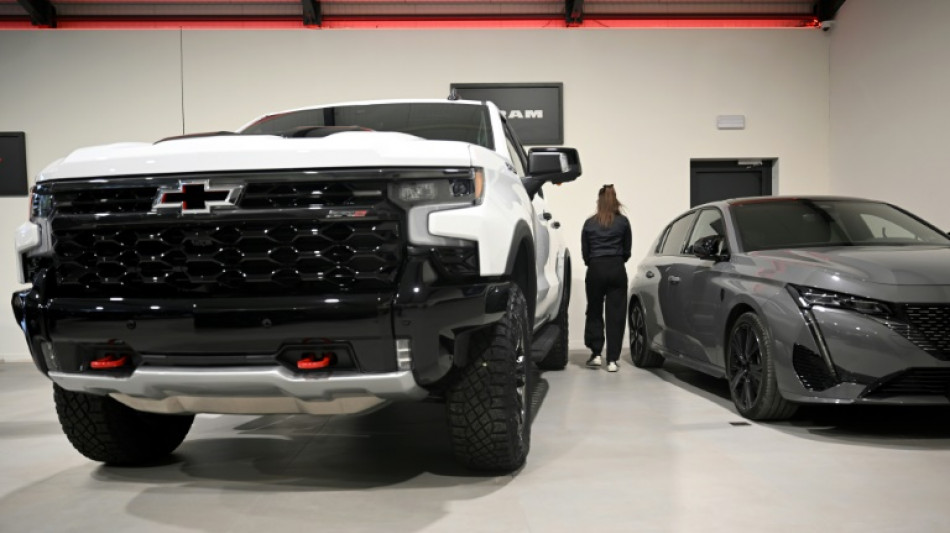
-
 Board of Spain's Sabadell bank rejects BBVA takeover bid
Board of Spain's Sabadell bank rejects BBVA takeover bid
-
Hunt for shooter of Charlie Kirk enters third day in US

-
 'Volatile': Londoners and asylum seekers on edge due to protests
'Volatile': Londoners and asylum seekers on edge due to protests
-
New David Bowie museum unmasks the man behind the make up

-
 Man Utd keeper Onana joins Trabzonspor on loan
Man Utd keeper Onana joins Trabzonspor on loan
-
UK economy stalls in July in fresh government setback
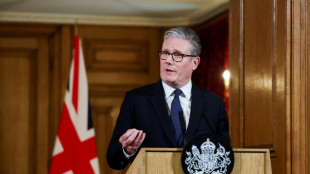
-
 Nepal seeks new leader as army reclaims streets after protest violence
Nepal seeks new leader as army reclaims streets after protest violence
-
Indonesia seizes part of nickel site over forest violations

-
 Stocks rally into weekend with US rate cut 'seemingly locked in'
Stocks rally into weekend with US rate cut 'seemingly locked in'
-
Springboks, Pumas out to keep Rugby Championship hopes alive

-
 Scrutiny on Thai zoo grows after lion attack
Scrutiny on Thai zoo grows after lion attack
-
UK economy stalls in July
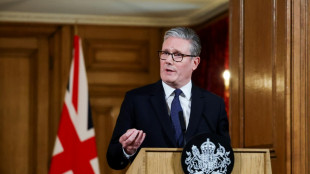
-
 Charlie Kirk's killing: what we know
Charlie Kirk's killing: what we know
-
S. Korean workers arrive home after US detention
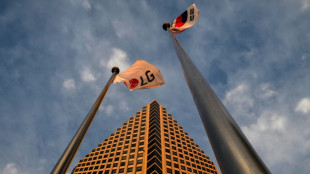
-
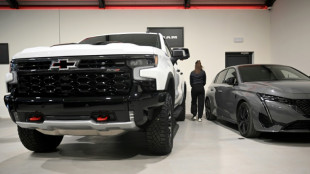 US tariffs deal stokes 'monster' pick-up fears in Europe
US tariffs deal stokes 'monster' pick-up fears in Europe
-
Saint Lucia's Alfred says Olympic gold shows talent counts, not your passport

-
 Springboks hard man Wiese to take the All Blacks head-on
Springboks hard man Wiese to take the All Blacks head-on
-
Tinch's journey to be hurdles title contender sparked by stepdad's joke

-
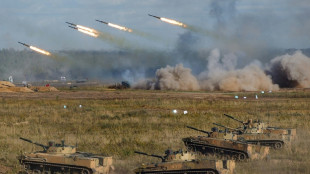 Russia, Belarus start military drills as West watches warily
Russia, Belarus start military drills as West watches warily
-
UN General Assembly to vote on a Hamas-free Palestinian state

-
 For theatre legend John Kani, art must 'speak truth to power'
For theatre legend John Kani, art must 'speak truth to power'
-
Ukraine's energy strikes hit Russians at the pump
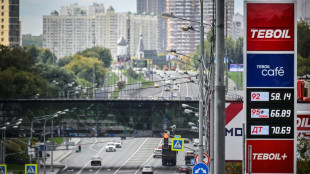
-
 Guinea's Tierno Monenembo: stolen words and diehard critic of military rule
Guinea's Tierno Monenembo: stolen words and diehard critic of military rule
-
Norman says 'we changed the game' as he officially departs LIV Golf

-
 From Discord to Bitchat, tech at the heart of Nepal protests
From Discord to Bitchat, tech at the heart of Nepal protests
-
Crawford chases history in super middleweight title showdown with Alvarez

-
 'I chose myself': Israeli transgender ref's journey to the top
'I chose myself': Israeli transgender ref's journey to the top
-
'No pressure' for teen Lutkenhaus, Team USA's youngest worlds athlete

-
 De Minaur vows to 'make life difficult' for Belgium in Davis Cup
De Minaur vows to 'make life difficult' for Belgium in Davis Cup
-
Inoue out to prove pound-for-pound credentials against Akhmadaliev

-
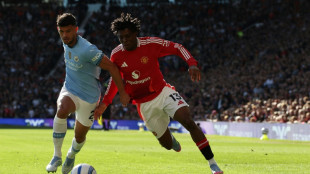 Manchester derby offers chance to salve wounds, Isak prepares for Liverpool bow
Manchester derby offers chance to salve wounds, Isak prepares for Liverpool bow
-
Love, Kraft star as Packers cruise past Commanders 27-18

-
 Trump's push for peace prize won't sway us, says Nobel committee
Trump's push for peace prize won't sway us, says Nobel committee
-
Wallabies skipper says wounded Argentina 'a scary proposition'

-
 'Your own brother': Student supporters mourn Charlie Kirk
'Your own brother': Student supporters mourn Charlie Kirk
-
Asian stocks surge into weekend with US rate cut 'seemingly locked in'

-
 Canada's Hughes seizes one-shot lead in PGA Procore Championship
Canada's Hughes seizes one-shot lead in PGA Procore Championship
-
'Severance' vs. 'The Pitt' at television's Emmy Awards

-
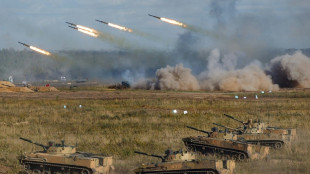 Russia, Belarus to stage military drills as West watches warily
Russia, Belarus to stage military drills as West watches warily
-
S. Korea workers head home after US immigration raid
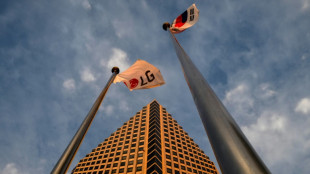
-
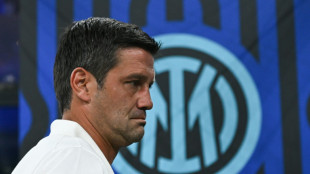 Chivu's Inter still a work in progress ahead of Juve clash
Chivu's Inter still a work in progress ahead of Juve clash
-
Hamburg visit Bayern as one of Germany's biggest rivalries returns

-
 Backed by BlueCo, Strasbourg spend big and aim high
Backed by BlueCo, Strasbourg spend big and aim high
-
Bordeaux-Begles' Woki says he matured at Racing ahead of return

-
 Familiar foes face off in Women's Rugby World Cup quarter-finals
Familiar foes face off in Women's Rugby World Cup quarter-finals
-
Barca Liga homecoming against Valencia reduced to tiny stadium

-
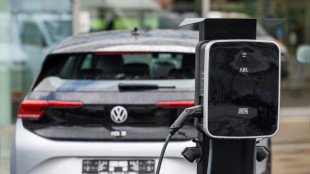 Carmakers to push EU for 2035 combustion-engine ban rethink
Carmakers to push EU for 2035 combustion-engine ban rethink
-
Canadian players acquitted in assault case can return to NHL December 1

-
 Empire Metals Limited Announces Exercise of Options
Empire Metals Limited Announces Exercise of Options
-
Agronomics Limited Announces Clean Food Group Update


US tariffs deal stokes 'monster' pick-up fears in Europe
Considered powerful, heavy-duty vehicles by their fans and dangerous gas-guzzling "monsters" by detractors -- could large pick-up trucks, long a staple on US roads, be about to roam in greater numbers across Europe?
An EU pledge to recognise US automotive standards left critics spooked it would open the door for more of the giant vehicles to be imported into the 27-nation bloc -- although the European Commission has moved to play down the possibility.
"If implemented, 20 years of safety, air pollution and CO2 progress will be killed off overnight," said James Nix, of advocacy group Transport & Environment (T&E), describing pick-ups as "monster trucks".
Popular pick-ups like the RAM and the Ford F-150 are not type-approved in Europe and can currently be imported only on an ad-hoc basis.
The system was designed to allow cars modified for disabled drivers or for use by search and rescue services, but general public interest is growing.
About 7,000 pick-ups were sold across the continent in 2024, up from a few hundred units six years ago, according to T&E.
At a specialised dealership in Leopoldsburg, a small eastern Belgium town, several shiny models with the trademark high bonnet towered over a compact Peugeot, hiding it from view.
"It's truly a combination of a work vehicle and a comfortable family car," said Dogan Yilmaz, the owner of the dealership aptly named US Trucks.
Imported from the United States, often via Germany, the "powerful" large vehicles are mostly bought by self-employed professionals and small firms working in construction or farming, he said.
"There is indeed a clear demand," he said.
One of only three distributors in Belgium, US Trucks sells up to 30 a year.
- 'Cost lives' -
A joint US-EU trade statement last month raised the prospect numbers could increase.
Brussels and Washington said they intended "to accept and provide mutual recognition to each other's standards" on automobiles.
The pledge came in a non-binding text that put some flesh on the bones of a framework accord struck in July for most EU exports to face a 15-percent US tariff.
Coming after fraught negotiations, the July deal eliminated levies on US vehicles imported to Europe and staved off the threat of higher US levies on European cars and other goods.
While leaving many details to be defined, it also appeased US President Donald Trump, a vocal supporter of US-made stuff, amid heightened geopolitical tensions.
But it blindsided environmentalists and road safety advocates.
The European Transport Safety Council (ETSC), a Brussels-based non-profit, said it would "cost lives on Europe's roads" -- for vehicles in Europe have to meet certain safety requirements that their US peers do not.
These include seatbelt reminder and emergency braking systems, lane-keeping assistance and designs that limit the impact of a crash on pedestrians -- such as a ban on razor sharp edges.
- No reduction -
Campaigners credit the stricter European rules for a decline in annual pedestrian deaths per million inhabitants, which are three times higher in the United States.
Pick-up truck drivers are safer than average in a collision. But for a pedestrian or cyclist hit by them the risk of serious injury increases by 90 percent, according to ETSC.
"RAM bonnets are so high that children aged up to nine years old standing directly in front cannot be seen by the average driver," T&E said.
Large and heavy cars also tend to pollute more than the average, the group added.
The joint EU-US statement provided no details on exactly what standards would be recognised and when.
But European Commission spokesman Olof Gill Thursday ruled out lowering EU standards.
"There are areas where we can look at for cooperation, but certainly we're not going to reduce any of our own standards that we've built up over many decades," he said.
The commission had earlier said that US-EU interest in addressing "red tape that hinders trade" included "the possibility of working towards recognising some of each other's standards".
Still, any changes would have to be approved by member states and the European Parliament, which might be hard to persuade.
"We worked extremely hard to decrease the number of fatalities on roads," said Virginijus Sinkevicius, a Green lawmaker and the vice-chair of parliament's transport committee, noting European producers had invested time and money in meeting EU rules.
A.Rodriguezv--AMWN